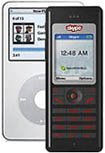What do iPod/iTunes and Skype have in common?
More than headphones and wireless ambitions... its all about the 'free-stuff'.
 They are both audio-centric product/services that are dependent on the internet. Skype is a P2P application made valuable by a device, (your PC, or more recently, your mobile phone or PDA) while the iPod is a device made valuable by P2P applications.
They are both audio-centric product/services that are dependent on the internet. Skype is a P2P application made valuable by a device, (your PC, or more recently, your mobile phone or PDA) while the iPod is a device made valuable by P2P applications.
Both were initially designed to require headpones, and both have just made their first tentative steps into wireless. Skype through its September '05 deal with Germany's E-Plus, and Apple with its deal with Motorola and Cingular to sell the iTunes-equipped Motorola E790 mobiles, with more wireless deals and developments to follow for both companies no doubt.
"Both have been the catalysts for a growing cluster of
interlinked third-party products"
 The two things that really strike me as similar are firstly, the way both Apple and Skype have managed to move these products beyond being single propositions, to each being the catalyst for a growing cluster of interlinked third-party products. Skype have done this by releasing their API which has spawned a growing batch of extensible ‘Skypbrids’ (Jyve, Yapper, Spontania etc) that have dramatically extended the companies influence. Apple have achieved a similar result by fostering a plethora of third party vendors who have produced scores of iPod add-ons and accessories. (and this is to say nothing of the fortuitous gift of Podcasting… Wow, what a lucky break that was!) In short, both companies are well on their way to turning their products into standards or platforms, depending on which way you define those terms.
The two things that really strike me as similar are firstly, the way both Apple and Skype have managed to move these products beyond being single propositions, to each being the catalyst for a growing cluster of interlinked third-party products. Skype have done this by releasing their API which has spawned a growing batch of extensible ‘Skypbrids’ (Jyve, Yapper, Spontania etc) that have dramatically extended the companies influence. Apple have achieved a similar result by fostering a plethora of third party vendors who have produced scores of iPod add-ons and accessories. (and this is to say nothing of the fortuitous gift of Podcasting… Wow, what a lucky break that was!) In short, both companies are well on their way to turning their products into standards or platforms, depending on which way you define those terms.
 Both Skype and the iPod have also become functional participants in global-scale ‘free-stuff’ consumer movements. Skype, by being the best-known conduit for free global voice calls, and the iPod, by being the best recepticle for playing digital music, in a world that is literally awash with free music. These factors have allowed Apple and Skype to harness some very powerful network effects, and network effects are what enduring success in the information economy is all about, just ask Bill Gates.
Both Skype and the iPod have also become functional participants in global-scale ‘free-stuff’ consumer movements. Skype, by being the best-known conduit for free global voice calls, and the iPod, by being the best recepticle for playing digital music, in a world that is literally awash with free music. These factors have allowed Apple and Skype to harness some very powerful network effects, and network effects are what enduring success in the information economy is all about, just ask Bill Gates.
A network-effect is said to occur when the value of a product or service increases with the amount of people that use it. If this increasing value is highly prized, a product can become almost invincible, because the more popular it becomes the more value the user receives. Network effects apply to Skype in exactly the same way that they are often explained in relation to the telephone. i.e. the more telephones there are, the more people you can call, so the more useful the facility becomes. Skype is climbing that curve, and has been assisted by the way it clusters users into myriad subsets, in what David P. Reed calls the ‘sneaky exponential’ of ‘Group Forming Networks’.
However, in regard to the iPod, the Network Effect theory is not so obvious. One iPod or 10 million iPods, how does the value increase per user? To achieve the power of network effects, Apple had to finesse its way through a potential mine-field to build value for the iPod from another part of music’s value-scape. (have you worked it out yet?)
Unlike the telephone, Microsoft’s claim to ‘Network Effect’ status was not so much because of the inherent usefulness of the product, but the value of the countless third party software titles made for the platform. Bill’s system became increasingly useful because it gave customers access to all that software. Steve’s iPod and its cross-platform virtual counterpart iTunes, are useful in the same way; they give the user the best method of interfacing and listening to all that music, and most of it is not coming from the ITMS.
As at Q3/2005, Apple had apparently sold approximately 500 million songs from the ITMS and approximately 22 million iPods, so this equals roughly 22.7 ITMS songs purchased per iPod and this in turn equates to only around 0.7% of a 3,000 song iPod. with many iPods potentially holding up to 15,000 songs. Although some of that vast iPod hard disk space is being filled by copying personal CDs, this still represents a massive freeing of music from the CD format taking it one small step away from broad dissemination on the internet. So, it is fairly clear that one of the main reasons that the iPod has been so successful is that it has tapped into the most controversial and pervasive internet phenomenon of recent times, music file-sharing; and this is where Apple has (indirectly) benefited from those very useful network effects.
It works like this. The more songs that are available on a file sharing network, the greater the value of that collection to downloaders. This is why all the major P2P file-sharing networks are open systems that interlink their massive virtual music libraries. The iPod and its sister product iTunes sit smack in the middle of this massive ocean of music in much the same way that MS-DOS and then Windows sat astride an ocean of PC software. The Pod/Tunes is simply the best way to convert, sort and listen to digital music. (but don’t tell BMG and Warner Music, they are finding the relationship with Apple a challenge as it is!)
Obviously, the Video iPod has been designed in exactly the same way, with a legitimate shop-front in iTunes, but a flexible functionality that allows for much wider usage.
 They are both audio-centric product/services that are dependent on the internet. Skype is a P2P application made valuable by a device, (your PC, or more recently, your mobile phone or PDA) while the iPod is a device made valuable by P2P applications.
They are both audio-centric product/services that are dependent on the internet. Skype is a P2P application made valuable by a device, (your PC, or more recently, your mobile phone or PDA) while the iPod is a device made valuable by P2P applications.Both were initially designed to require headpones, and both have just made their first tentative steps into wireless. Skype through its September '05 deal with Germany's E-Plus, and Apple with its deal with Motorola and Cingular to sell the iTunes-equipped Motorola E790 mobiles, with more wireless deals and developments to follow for both companies no doubt.
"Both have been the catalysts for a growing cluster of
interlinked third-party products"
 The two things that really strike me as similar are firstly, the way both Apple and Skype have managed to move these products beyond being single propositions, to each being the catalyst for a growing cluster of interlinked third-party products. Skype have done this by releasing their API which has spawned a growing batch of extensible ‘Skypbrids’ (Jyve, Yapper, Spontania etc) that have dramatically extended the companies influence. Apple have achieved a similar result by fostering a plethora of third party vendors who have produced scores of iPod add-ons and accessories. (and this is to say nothing of the fortuitous gift of Podcasting… Wow, what a lucky break that was!) In short, both companies are well on their way to turning their products into standards or platforms, depending on which way you define those terms.
The two things that really strike me as similar are firstly, the way both Apple and Skype have managed to move these products beyond being single propositions, to each being the catalyst for a growing cluster of interlinked third-party products. Skype have done this by releasing their API which has spawned a growing batch of extensible ‘Skypbrids’ (Jyve, Yapper, Spontania etc) that have dramatically extended the companies influence. Apple have achieved a similar result by fostering a plethora of third party vendors who have produced scores of iPod add-ons and accessories. (and this is to say nothing of the fortuitous gift of Podcasting… Wow, what a lucky break that was!) In short, both companies are well on their way to turning their products into standards or platforms, depending on which way you define those terms. Both Skype and the iPod have also become functional participants in global-scale ‘free-stuff’ consumer movements. Skype, by being the best-known conduit for free global voice calls, and the iPod, by being the best recepticle for playing digital music, in a world that is literally awash with free music. These factors have allowed Apple and Skype to harness some very powerful network effects, and network effects are what enduring success in the information economy is all about, just ask Bill Gates.
Both Skype and the iPod have also become functional participants in global-scale ‘free-stuff’ consumer movements. Skype, by being the best-known conduit for free global voice calls, and the iPod, by being the best recepticle for playing digital music, in a world that is literally awash with free music. These factors have allowed Apple and Skype to harness some very powerful network effects, and network effects are what enduring success in the information economy is all about, just ask Bill Gates.A network-effect is said to occur when the value of a product or service increases with the amount of people that use it. If this increasing value is highly prized, a product can become almost invincible, because the more popular it becomes the more value the user receives. Network effects apply to Skype in exactly the same way that they are often explained in relation to the telephone. i.e. the more telephones there are, the more people you can call, so the more useful the facility becomes. Skype is climbing that curve, and has been assisted by the way it clusters users into myriad subsets, in what David P. Reed calls the ‘sneaky exponential’ of ‘Group Forming Networks’.
However, in regard to the iPod, the Network Effect theory is not so obvious. One iPod or 10 million iPods, how does the value increase per user? To achieve the power of network effects, Apple had to finesse its way through a potential mine-field to build value for the iPod from another part of music’s value-scape. (have you worked it out yet?)
Unlike the telephone, Microsoft’s claim to ‘Network Effect’ status was not so much because of the inherent usefulness of the product, but the value of the countless third party software titles made for the platform. Bill’s system became increasingly useful because it gave customers access to all that software. Steve’s iPod and its cross-platform virtual counterpart iTunes, are useful in the same way; they give the user the best method of interfacing and listening to all that music, and most of it is not coming from the ITMS.
As at Q3/2005, Apple had apparently sold approximately 500 million songs from the ITMS and approximately 22 million iPods, so this equals roughly 22.7 ITMS songs purchased per iPod and this in turn equates to only around 0.7% of a 3,000 song iPod. with many iPods potentially holding up to 15,000 songs. Although some of that vast iPod hard disk space is being filled by copying personal CDs, this still represents a massive freeing of music from the CD format taking it one small step away from broad dissemination on the internet. So, it is fairly clear that one of the main reasons that the iPod has been so successful is that it has tapped into the most controversial and pervasive internet phenomenon of recent times, music file-sharing; and this is where Apple has (indirectly) benefited from those very useful network effects.
It works like this. The more songs that are available on a file sharing network, the greater the value of that collection to downloaders. This is why all the major P2P file-sharing networks are open systems that interlink their massive virtual music libraries. The iPod and its sister product iTunes sit smack in the middle of this massive ocean of music in much the same way that MS-DOS and then Windows sat astride an ocean of PC software. The Pod/Tunes is simply the best way to convert, sort and listen to digital music. (but don’t tell BMG and Warner Music, they are finding the relationship with Apple a challenge as it is!)
Obviously, the Video iPod has been designed in exactly the same way, with a legitimate shop-front in iTunes, but a flexible functionality that allows for much wider usage.